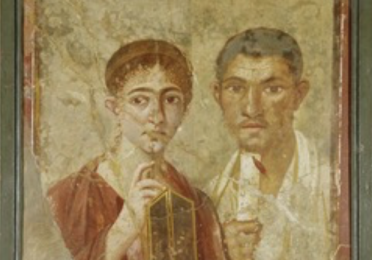- Summer 2020
Syllabus Description:
Course Information
Instructor: Emma Brobeck
(More info on the instructor here)
Email: ebrobeck@uw.edu
Office Hours: W/Th 1-2 PM on Zoom
NOTE: The Summer 2020 offering of Clas 122 will be taught entirely on-line as a group-start course: students will begin and end together.
Course Description
This course provides an introduction to Greek and Roman ways of understanding and shaping the world. Art, architecture, literature, science, and religion, are used to examine ancient ideas about relationships between man and woman, free person and slave, native and foreigner, civilization and the natural world, mortal and divine. No prerequisites.
Learning Objectives
By the end of the course, students will demonstrate the ability to:
- recognize, describe and analyze major features of ancient Greek and Roman religious, cultural, and political life across a variety of social, economic, gender, and ethnic categories
- recognize, describe and analyze the operation of ideologies that shaped and constrained the experiences of individuals and groups in ancient Greek and Roman society
- recognize, describe and analyze some important examples of the subsequent impact of ancient Greek and Roman ideologies
Required Texts
- Price and Thonemann, Birth of Classical Europe (available from UW Bookstore and as an e book here)
- Euripides, Ion translated by W.S. di Piero with commentary by Peter Burian (available from UW Bookstore and and as an ebook from UW Libraries here)
- excerpts from ancient Greek and Roman literary texts and a selection of scholarly articles, to be made available on Canvas
Academic Integrity
University of Washington students are expected to practice high standards of academic and professional honesty and integrity as outlined here: http://depts.washington.edu/grading/pdf/AcademicResponsibility.pdf
Learning Support: Access and Accommodations
If you have already established accommodations with Disability Resources for Students (DRS), please communicate your approved accommodations to the instructor at your earliest convenience so that your needs in this course can be discussed. If you have not yet established services through DRS, but have a temporary health condition or permanent disability that requires accommodations (conditions include but not limited to; mental health, attention-related, learning, vision, hearing, physical or health impacts), you are welcome to contact DRS at 206-543-8924 or uwdrs@uw.eduor uw.edu.) DRS offers resources and coordinates reasonable accommodations for students with disabilities and/or temporary health conditions. Reasonable accommodations are established through an interactive process between you, your instructor(s) and DRS. It is the policy and practice of the University of Washington to create inclusive and accessible learning environments consistent with federal and state law.
Religious Accommodations
Washington state law requires that UW develop a policy for accommodation of student absences or significant hardship due to reasons of faith or conscience, or for organized religious activities. The UW’s policy, including more information about how to request an accommodation, is available at Religious Accommodations Policy (https://registrar.washington.edu/staffandfaculty/religious-accommodations-policy/).). Accommodations must be requested within the first two weeks of this course using the Religious Accommodations Request form (https://registrar.washington.edu/students/religious-accommodations-request/).”
Grading
- Reading Quizzes 45%
- Individual Writing Assignments 45%
- Canvas Group Activities 10%
Course Schedule
All quizzes, Canvas activities, and writing assignments are due on Sunday night (11:59 pm) each week.
Each week of the course contains the following:
- Lecture pages provide general orientation and illustrate sites and objects discussed in the readings and help prepare you for each week's writing assignment.
- New Voices in Classics videos are throughout the course. These are short videos in which a scholar who earned their PhD at UW speaks about their area of research. The purpose of these videos is to expose students to a range of points of view and methods in research on the ancient Greek and Roman world. After reading the introduction and quiz question preview, you watch the video (approximately 10 mins) and take a brief quiz.
- Readings: mainly P&T (Price and Thonemann Birth of Classical Europe); some ancient texts are also treated as readings. Each reading has a reading guide (that shows you what to focus on and previews the quiz questions)and a quiz that you need to take. Quiz questions include multiple choice and free response/short essay and other formats. Quizzes = 45% of your grade.
- Reading Quizzes: These are open book, 60 minutes max, and can be taken twice.
- Writing assignments: Weekly straightforward writing assignments generally of about 200-500 words ask you to integrate information from the lecture pages and the readings into an analysis of selections (of varied lengths) from ancient Greek and Roman texts. You will need time to read the ancient text (some short, some longer) and to write about it. Writing assignments = 45% of your grade. Rubric for the assessment of writing assignments is here.
- Group Activities: The group activities act as supplementary material for you to synthesize information from the ancient texts and provide an opportunity for you to engage in collaborative work with your classmates.
All course materials are not to be posted elsewhere by students without the express written permission of the instructor.
Week 1: Homer and the Bronze Age
Lessons: Intro to the Greek World, The Bronze Age, and Intro to Homer
Readings:
P&T Ch. 1 pp. 11-44 (Reading Guide)
Primary Source Reading: excerpts from Homer’s Odyssey
Assignments:
Writing Activity: Homer’s Odyssey
Week 2: Hesiod and the Dark Ages
Lessons: The Dark Ages and Intro to Hesiod
Readings:
P&T Ch. 2 pp. 45-50, 60-68 (Reading Guide)
Primary Source Reading: excerpts from Hesiod’s Works and Days
Assignments:
P&T Quiz 2
New Voices in Classics: Eunice Kim
Week 3: Rise of the Polis
Lessons: Rise of the Polis in Miletus and Athens and Intro to Hippocrates
Readings:
P&T Ch. 3 pp. 77-85, 100-112, Ch, 4 pp. 113-27 (Ch. 3 Reading Guide, Ch. 4 Reading Guide)
Primary Source Reading: Hippocrates
Assignments:
Week 4: Drama and Citizenship in Athens
Lessons: Drama and citizenship at Athens and Intro to Euripides
Readings:
Primary Source Reading: Euripides’ Ion
Assignments:
Week 5: Gender and Sexuality in Athens
Lessons: Gender and Sexuality and the Household in Athens and Intro to Menander
Readings:
P&T Ch. 4 pp. 128-144 (Ch. 4 Reading Guide #2)
Primary Source Reading: Menander
Assignments:
P&T Quiz 4b
New Voices in Classics: Yurie Hong
Week 6: Rise of the Roman Republic
Lessons: Introduction to Rome and Rise of the Roman Republic and Intro to Livy
Readings:
P&T Ch. 6 pp. 175-216 (Reading Guide)
Primary Source Reading: Livy
Assignments:
New Voices in Classics: Jackie Murray
Week 7: Rome From Republic to Empire
Lessons: From Republic to Empire and Intro to Caesar and Tacitus
Readings:
P&T Ch. 7 pp. 217-256 (Reading Guide)
Primary Source Reading: Caesar, Tacitus
Assignments:
Writing Activity: Caesar and Tacitus
New Voices in Classics: Adriana Vazquez
Week 8: The Roman Empire
Lessons: The Roman Empire and Intro to Imperial Writers
Readings:
PT Ch. 8 pp. 257-300 (Reading Guide)
Primary Source Reading: Aurelius, Perpetua, Augustine, Apuleius, Thecla
(Note: each member of the collaboration group will read one of the above authors)
Assignments:
P&T Quiz 8
Writing Activity: Imperial Writers
New Voices in Classics: Brandon Jones
Week 9: Roman Empire and Reception
Lesson: Reception of the Ancient World
Readings:
P&T Ch. 9 pp. 301-334 (Reading Guide)
Secondary Source Readings: Invention of Racism, Myth of Whiteness, (Reading Guide)
Assignments:
Quiz on Secondary Source Readings
Writing Activity


